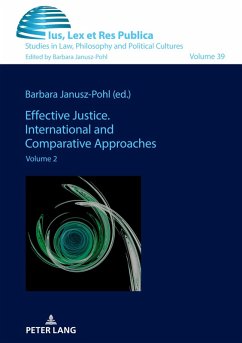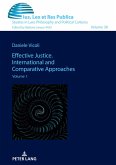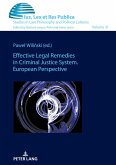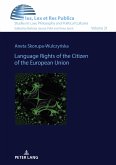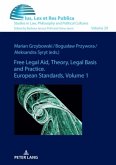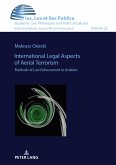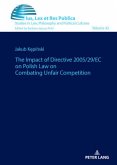Effective Justice. International and Comparative Approaches
Volume 2
Herausgegeben:Janusz-Pohl, Barbara
Effective Justice. International and Comparative Approaches
Volume 2
Herausgegeben:Janusz-Pohl, Barbara
- Gebundenes Buch
- Merkliste
- Auf die Merkliste
- Bewerten Bewerten
- Teilen
- Produkt teilen
- Produkterinnerung
- Produkterinnerung
The following monograph is the culmination of the collaborative efforts of dedicated researchers within the Effective Justice International and Comparative Approaches Platform.
The book captures works on the effectiveness of evidentiary issues, summary and abbreviated proceedings, as well as those related to the issue of access to an effective remedy. The common theme throughout the collection is the concept of effectiveness. Within the framework of the EJ Platform, effectiveness was the primary focus, and its meaning was outlined against the background of other closely related terms such…mehr
Andere Kunden interessierten sich auch für
![Effective Justice. International and Comparative Approaches Effective Justice. International and Comparative Approaches]() Effective Justice. International and Comparative Approaches59,95 €
Effective Justice. International and Comparative Approaches59,95 €![Effective Legal Remedies in Criminal Justice System. European Perspective Effective Legal Remedies in Criminal Justice System. European Perspective]() Effective Legal Remedies in Criminal Justice System. European Perspective59,95 €
Effective Legal Remedies in Criminal Justice System. European Perspective59,95 €![Language Rights of the Citizen of the European Union Language Rights of the Citizen of the European Union]() Aneta Skorupa-WulczynskaLanguage Rights of the Citizen of the European Union64,85 €
Aneta Skorupa-WulczynskaLanguage Rights of the Citizen of the European Union64,85 €![Free Legal Aid - A Comparative Approach Free Legal Aid - A Comparative Approach]() Free Legal Aid - A Comparative Approach49,95 €
Free Legal Aid - A Comparative Approach49,95 €![Free Legal Aid, Theory, Legal Basis and Practice. European Standards Free Legal Aid, Theory, Legal Basis and Practice. European Standards]() Free Legal Aid, Theory, Legal Basis and Practice. European Standards59,95 €
Free Legal Aid, Theory, Legal Basis and Practice. European Standards59,95 €![International Legal Aspects of Aerial Terrorism International Legal Aspects of Aerial Terrorism]() Mateusz OsieckiInternational Legal Aspects of Aerial Terrorism54,95 €
Mateusz OsieckiInternational Legal Aspects of Aerial Terrorism54,95 €![The impact of Directive 2005/29/EC on Polish law on combating unfair competition The impact of Directive 2005/29/EC on Polish law on combating unfair competition]() Jakub KepinskiThe impact of Directive 2005/29/EC on Polish law on combating unfair competition69,95 €
Jakub KepinskiThe impact of Directive 2005/29/EC on Polish law on combating unfair competition69,95 €-
-
-
The following monograph is the culmination of the collaborative efforts of dedicated researchers within the Effective Justice International and Comparative Approaches Platform.
The book captures works on the effectiveness of evidentiary issues, summary and abbreviated proceedings, as well as those related to the issue of access to an effective remedy. The common theme throughout the collection is the concept of effectiveness. Within the framework of the EJ Platform, effectiveness was the primary focus, and its meaning was outlined against the background of other closely related terms such as efficacy, effectivity, or efficiency. The effectiveness presented in this collection's chapters is seen in a multi-layered dimension related to the achievement of the goals inherent to a given procedure, institution, or process activity.
The book captures works on the effectiveness of evidentiary issues, summary and abbreviated proceedings, as well as those related to the issue of access to an effective remedy. The common theme throughout the collection is the concept of effectiveness. Within the framework of the EJ Platform, effectiveness was the primary focus, and its meaning was outlined against the background of other closely related terms such as efficacy, effectivity, or efficiency. The effectiveness presented in this collection's chapters is seen in a multi-layered dimension related to the achievement of the goals inherent to a given procedure, institution, or process activity.
Produktdetails
- Produktdetails
- Ius, Lex et Res Publica 39
- Verlag: Peter Lang
- Artikelnr. des Verlages: 290142
- 1. Auflage
- Seitenzahl: 416
- Erscheinungstermin: 24. April 2025
- Englisch
- Abmessung: 216mm x 153mm x 26mm
- Gewicht: 603g
- ISBN-13: 9783631901427
- ISBN-10: 3631901429
- Artikelnr.: 73992925
- Herstellerkennzeichnung
- Lang, Peter GmbH
- Gontardstraße 11
- 10178 Berlin
- r.boehm-korff@peterlang.com
- Ius, Lex et Res Publica 39
- Verlag: Peter Lang
- Artikelnr. des Verlages: 290142
- 1. Auflage
- Seitenzahl: 416
- Erscheinungstermin: 24. April 2025
- Englisch
- Abmessung: 216mm x 153mm x 26mm
- Gewicht: 603g
- ISBN-13: 9783631901427
- ISBN-10: 3631901429
- Artikelnr.: 73992925
- Herstellerkennzeichnung
- Lang, Peter GmbH
- Gontardstraße 11
- 10178 Berlin
- r.boehm-korff@peterlang.com
Barbara Janusz-Pohl is a professor at the Department of Criminal Procedure and the Director of the Legal Clinics - Laboratory at the Faculty of Adam Mickiewicz University in Poznañ. She is the author of more than 100 works, including several monographs and many papers published in distinguished scientific journals. She is a specialist in criminal procedure, although interdisciplinary research is of äpivotal meaning among her works. In this sense, many general philosophical and methodological approaches combined with concrete problems of criminal law have been researched.
Introduction
Editorial Prof. UAM dr hab. Barbara Janusz-Pohl
PART I: SPECIAL, ABBREVIATED PROCEDURE AND EVIDENCE
I. Between efficiency urges and expectations of justice in the Italian system. Deflation profiles of case dismissal for particular tenuity of the criminal act and for oblation Prof. Chiara Gabrielli; Dr Andrea Zampini
II. Restorative Justice in Croatia: A Potential for an Effective Criminal Justice System Prof. Aleksandar Marsavelski
III. Mediation in Criminal Proceedings as a Potentially Effective Tool for Restorative Justice Prof. US dr hab. Magdalena Kowalewska-£ukuæ
IV. Life Path Lessons of Children in Closed Childcare Institution Service in Estonia: Experiences and Practices Related to Interprofessional Collaboration-Based Support Dr Koidu Saia
V. Proceed with caution? Human rights concerns arising from the use of out-of-court disposals to improve efficiency in the criminal justice system Dr. Stephen Terrett
VI. Procedural treatment of prohibited evidence: its evolution in Spain Prof. Dr. Dr.h.c. Juan-Luis Gómez Colomer; Prof. Dr. Andrea Planchadell Gargallo; Dr. Christa M. Madrid Boquín
VII. The use of spy software as a means of obtaining evidence in criminal investigations and the need of effective remedies to safeguard fundamental rights: the case of Portugal Eduardo Bolsoni Riboli
VIII. Crimes of Harmful Consequences and Artificial Intelligence: Causation at the Bar Dr Federico C. La Vattiata
IX. Detection of usage deepfake technology in evidentiary proceedings on the ground of the Polish Code of Criminal Procedure Marcin Galiñski,
X. Message Applications Mirroring, Jurisprudential Interpretation, and the Challenging Chain of Custody in a Criminal Case Rodrigo da Silva Brandalise; Décio Alonso Gomes
PART II: SYSTEMS OF EFFECTIVE REMEDIES
I. The right to an effective remedy in the light of the length of the proceedings in the Polish criminal process according to the jurisprudence of the ECtHR dr hab. Szymon Pawelec, prof. UW
II. Fair trial rights violations and effective remedies in criminal proceedings-The ECHR perspective Dr Lorenzo Bernardini
III. Non-appealable nature of evidentiary decisions in appeal proceedings in Polish criminal trial from the perspective of the right to an effective remedy under Art. 13 ECHR Dr Aleksandra Komar-Nalepa
IV. Evidentiary misbehaviors and their consequences Dr Emanuele Toma
V. Securing Effective Collection of Evidence: An Overview of Various Approaches to Interrogation Techniques Micha³ Wawrzyñczak
VI. Effective Remedies for the Violation of Cultural Human Rights under International Law Dr Katarzyna Zombory
Editorial Prof. UAM dr hab. Barbara Janusz-Pohl
PART I: SPECIAL, ABBREVIATED PROCEDURE AND EVIDENCE
I. Between efficiency urges and expectations of justice in the Italian system. Deflation profiles of case dismissal for particular tenuity of the criminal act and for oblation Prof. Chiara Gabrielli; Dr Andrea Zampini
II. Restorative Justice in Croatia: A Potential for an Effective Criminal Justice System Prof. Aleksandar Marsavelski
III. Mediation in Criminal Proceedings as a Potentially Effective Tool for Restorative Justice Prof. US dr hab. Magdalena Kowalewska-£ukuæ
IV. Life Path Lessons of Children in Closed Childcare Institution Service in Estonia: Experiences and Practices Related to Interprofessional Collaboration-Based Support Dr Koidu Saia
V. Proceed with caution? Human rights concerns arising from the use of out-of-court disposals to improve efficiency in the criminal justice system Dr. Stephen Terrett
VI. Procedural treatment of prohibited evidence: its evolution in Spain Prof. Dr. Dr.h.c. Juan-Luis Gómez Colomer; Prof. Dr. Andrea Planchadell Gargallo; Dr. Christa M. Madrid Boquín
VII. The use of spy software as a means of obtaining evidence in criminal investigations and the need of effective remedies to safeguard fundamental rights: the case of Portugal Eduardo Bolsoni Riboli
VIII. Crimes of Harmful Consequences and Artificial Intelligence: Causation at the Bar Dr Federico C. La Vattiata
IX. Detection of usage deepfake technology in evidentiary proceedings on the ground of the Polish Code of Criminal Procedure Marcin Galiñski,
X. Message Applications Mirroring, Jurisprudential Interpretation, and the Challenging Chain of Custody in a Criminal Case Rodrigo da Silva Brandalise; Décio Alonso Gomes
PART II: SYSTEMS OF EFFECTIVE REMEDIES
I. The right to an effective remedy in the light of the length of the proceedings in the Polish criminal process according to the jurisprudence of the ECtHR dr hab. Szymon Pawelec, prof. UW
II. Fair trial rights violations and effective remedies in criminal proceedings-The ECHR perspective Dr Lorenzo Bernardini
III. Non-appealable nature of evidentiary decisions in appeal proceedings in Polish criminal trial from the perspective of the right to an effective remedy under Art. 13 ECHR Dr Aleksandra Komar-Nalepa
IV. Evidentiary misbehaviors and their consequences Dr Emanuele Toma
V. Securing Effective Collection of Evidence: An Overview of Various Approaches to Interrogation Techniques Micha³ Wawrzyñczak
VI. Effective Remedies for the Violation of Cultural Human Rights under International Law Dr Katarzyna Zombory
Introduction
Editorial Prof. UAM dr hab. Barbara Janusz-Pohl
PART I: SPECIAL, ABBREVIATED PROCEDURE AND EVIDENCE
I. Between efficiency urges and expectations of justice in the Italian system. Deflation profiles of case dismissal for particular tenuity of the criminal act and for oblation Prof. Chiara Gabrielli; Dr Andrea Zampini
II. Restorative Justice in Croatia: A Potential for an Effective Criminal Justice System Prof. Aleksandar Marsavelski
III. Mediation in Criminal Proceedings as a Potentially Effective Tool for Restorative Justice Prof. US dr hab. Magdalena Kowalewska-£ukuæ
IV. Life Path Lessons of Children in Closed Childcare Institution Service in Estonia: Experiences and Practices Related to Interprofessional Collaboration-Based Support Dr Koidu Saia
V. Proceed with caution? Human rights concerns arising from the use of out-of-court disposals to improve efficiency in the criminal justice system Dr. Stephen Terrett
VI. Procedural treatment of prohibited evidence: its evolution in Spain Prof. Dr. Dr.h.c. Juan-Luis Gómez Colomer; Prof. Dr. Andrea Planchadell Gargallo; Dr. Christa M. Madrid Boquín
VII. The use of spy software as a means of obtaining evidence in criminal investigations and the need of effective remedies to safeguard fundamental rights: the case of Portugal Eduardo Bolsoni Riboli
VIII. Crimes of Harmful Consequences and Artificial Intelligence: Causation at the Bar Dr Federico C. La Vattiata
IX. Detection of usage deepfake technology in evidentiary proceedings on the ground of the Polish Code of Criminal Procedure Marcin Galiñski,
X. Message Applications Mirroring, Jurisprudential Interpretation, and the Challenging Chain of Custody in a Criminal Case Rodrigo da Silva Brandalise; Décio Alonso Gomes
PART II: SYSTEMS OF EFFECTIVE REMEDIES
I. The right to an effective remedy in the light of the length of the proceedings in the Polish criminal process according to the jurisprudence of the ECtHR dr hab. Szymon Pawelec, prof. UW
II. Fair trial rights violations and effective remedies in criminal proceedings-The ECHR perspective Dr Lorenzo Bernardini
III. Non-appealable nature of evidentiary decisions in appeal proceedings in Polish criminal trial from the perspective of the right to an effective remedy under Art. 13 ECHR Dr Aleksandra Komar-Nalepa
IV. Evidentiary misbehaviors and their consequences Dr Emanuele Toma
V. Securing Effective Collection of Evidence: An Overview of Various Approaches to Interrogation Techniques Micha³ Wawrzyñczak
VI. Effective Remedies for the Violation of Cultural Human Rights under International Law Dr Katarzyna Zombory
Editorial Prof. UAM dr hab. Barbara Janusz-Pohl
PART I: SPECIAL, ABBREVIATED PROCEDURE AND EVIDENCE
I. Between efficiency urges and expectations of justice in the Italian system. Deflation profiles of case dismissal for particular tenuity of the criminal act and for oblation Prof. Chiara Gabrielli; Dr Andrea Zampini
II. Restorative Justice in Croatia: A Potential for an Effective Criminal Justice System Prof. Aleksandar Marsavelski
III. Mediation in Criminal Proceedings as a Potentially Effective Tool for Restorative Justice Prof. US dr hab. Magdalena Kowalewska-£ukuæ
IV. Life Path Lessons of Children in Closed Childcare Institution Service in Estonia: Experiences and Practices Related to Interprofessional Collaboration-Based Support Dr Koidu Saia
V. Proceed with caution? Human rights concerns arising from the use of out-of-court disposals to improve efficiency in the criminal justice system Dr. Stephen Terrett
VI. Procedural treatment of prohibited evidence: its evolution in Spain Prof. Dr. Dr.h.c. Juan-Luis Gómez Colomer; Prof. Dr. Andrea Planchadell Gargallo; Dr. Christa M. Madrid Boquín
VII. The use of spy software as a means of obtaining evidence in criminal investigations and the need of effective remedies to safeguard fundamental rights: the case of Portugal Eduardo Bolsoni Riboli
VIII. Crimes of Harmful Consequences and Artificial Intelligence: Causation at the Bar Dr Federico C. La Vattiata
IX. Detection of usage deepfake technology in evidentiary proceedings on the ground of the Polish Code of Criminal Procedure Marcin Galiñski,
X. Message Applications Mirroring, Jurisprudential Interpretation, and the Challenging Chain of Custody in a Criminal Case Rodrigo da Silva Brandalise; Décio Alonso Gomes
PART II: SYSTEMS OF EFFECTIVE REMEDIES
I. The right to an effective remedy in the light of the length of the proceedings in the Polish criminal process according to the jurisprudence of the ECtHR dr hab. Szymon Pawelec, prof. UW
II. Fair trial rights violations and effective remedies in criminal proceedings-The ECHR perspective Dr Lorenzo Bernardini
III. Non-appealable nature of evidentiary decisions in appeal proceedings in Polish criminal trial from the perspective of the right to an effective remedy under Art. 13 ECHR Dr Aleksandra Komar-Nalepa
IV. Evidentiary misbehaviors and their consequences Dr Emanuele Toma
V. Securing Effective Collection of Evidence: An Overview of Various Approaches to Interrogation Techniques Micha³ Wawrzyñczak
VI. Effective Remedies for the Violation of Cultural Human Rights under International Law Dr Katarzyna Zombory

